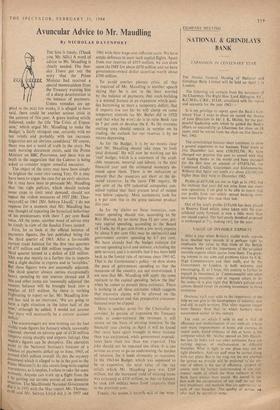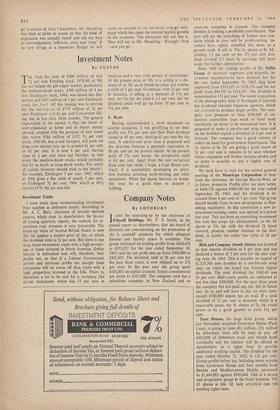Avuncular Advice to Mr. Maudling
By NICHOLAS DAVENPORT
THE hint is timely. (Thank you, Mr. Sills.) A word of advice to Mr. Maudling is clearly needed. The Sun- day Times put out the story that the Prime X41& s. ZZLEZZ Minister had received a special memorandum from the Treasury warning him of a sharp deterioration in the balance of payments. Unless remedies are ap- plied in the next few weeks, it is alleged to have said, there could be another serious crisis in the autumn of this year. A grave leading article followed, under the title 'The Crisis of Expan- sion,' which urged Mr. Maudling to make the Budget 'a fairly stringent one, certainly with no tax reliefs and probably with tax increases (cigarettes are an obvious candidate).' Of course, there was not a word of truth in the story. No such warning document exists, said the Prime Minister on BBC Panorama, and there was no truth in the suggestion that the Cabinet is being asked to consider urgent remedial measures.
The object of the story may have been simply to frighten the voter into voting Tory. Or it may have been to argue the case for an early election. Or it may have been to persuade Mr. Maudling that `the right policies, which should include some steps to limit total demand, should not repeat the violent measures of 1957 [Mr. Thor- neycroft] or 1961 [Mr. Selwyn Lloyd].' I do not suppose for a moment that Mr. Maudling has any thought of repeating the hysterical behaviour of his predecessors with their 7 per cent Bank rates. All the same, another word of advice may be timely in view of the Sunday Times canard.
First, let us look at the official balance of payments figures, the last published being for the third quarter of 1963. After a favourable current trade balance for the first two quarters of £77 million and £68 million respectively, the third quarter turned in a deficit of £28 million. This was due mainly to a further rise in imports and a slight decline in exports and in 'invisibles.' But these figures were not seasonally adjusted. Me third quarter always carries exceptionally heavy spending by our tourists abroad and if this and other items are 'seasonally adjusted' the current balance will be brought back into a surplus of £15 million. So there is nothing frightening to report so far. Mr. Maudling him- self has said in an interview, 'We are going to have a tight situation in the latter half of the Year,' although he added, 'I would not assume that there will necessarily be a current account deficit.'
The scaremongers are now trotting out the bad visible trade figures for January which, seasonally adjusted, showed an adverse gap of £120 million (Imports rising sharply and exports falling). One Month's figures can be deceptive. The alarmists Point to the National Institute's forecast of a balance of payments deficit up to June, 1965, of around £365 million overall. (Is this the mystery document which is alleged to be in the post to the Prime Minister?) As this covers long-term capital movements, as it implies, I refuse to take the scare seriously. Anyone can work up a flight from the by putting out terrible stories of our domestic situation. The MacDonald National Government did it in 1931 with the May report. Mr. Thorney- croft and Mr. Selwyn Lloyd did it in 1957 and
1961 with their wage-cost inflation scare. We have ample defences to meet such capital flights. Apart from our reserves of £955 million, we can draw upon the IMF for about £870 million and we have government-owned dollar securities worth about £350 million.
To avoid another phoney crisis, all that is required of Mr. Maudling is another speech saying that he is not in the least worried by the balance of payments, that stock-building is a normal feature in an expansion which justi- fies borrowing to meet a temporary deficit; that if imports rise too far he will clamp on some temporary controls (as Mr. Butler did in 1952) and that what he won't do is to raise Bank rate to 7 per cent or devalue the £. As the overseas sterling area should remain in surplus on its trading, the outlook for our reserves is by no means depressing.
As for the Budget, it is by no means clear that Mr. Maudling should take steps 'to limit total demand.' He will now be working out his `rear budget, which is a statement of the avail- able resources, material and labour, in the next financial year and the estimated monetary de- mand upon them. There is no indication at present that the resources are short or the de- mand excessive. In the latest FBI inquiry, 50 per cent of the 659 industrial companies con- sulted replied that their present level of output was below capacity. Mbst economists look for a 6 per cent rise in the gross national product this year.
As for the claims on these resources, 'con- sumer spending should rise, according to Sir Roy Harrod, by no more than 31 per cent, pri- vate capital spending, according to the Board of Trade, by 10 per cent from a low level, exports by about 6 per cent. (this may be optimistic) and government current spending by 6.7 per cent. We have already had 'the budget estimate for current spending (civil and defence, excluding the debt service), and it is notable that it has been held back to the lowest rate of increase since 1961-62. That is the Government's policy—To slow down the pace of government spending so that the resources of the country are not overstrained. I am sure that Mr. Maudling will apply the same restraint to the capital spending 'below the line' when he comes to present these estimates. There is nothing in all these estimates which suggests that excessive claims will be allowed on the national resources and that prospective consumer demand must be clipped.
Here is another point for the Chancellor to consider. In periods of expansion the Treasury tends to under-estimate the revenues it will secure on the basis of existing taxation. In the financial year closing in April it will be found that taxes have again brought in more revenue than was anticipated, while government expendi- tures have risen less than was expected. This joke should not be repeated too often. It is too serious an error to go on understating the burden of taxation, for it leads ultimately to recession. In the 1963-64 Budget, which was supposed to be so expansive, the total value of the tax reliefs which Mr. Maudling gave was £269 million, but the increased yield of exis:ing taxes was estimated at £318 million, so that on balance he took £49 'million more from taxpayers than in the previous year.
Finally, the nation is heartily sick of the 'stop- go' practices of Tory Chancellors. Mt. Maudling has been at pains to assure us that his kind of expansion was soundly based and did not lead to over-expansion, inflation, crisis and 'stop.' If he now brings in a repressive Budget he will surely be accused ot the oid slated stop-go' tech- nique which has upset the normal healthy growth of the economy. The electorate will not like it. They will say to Mr. Maudling: 'Enough! Stop —and you go.'







































 Previous page
Previous page